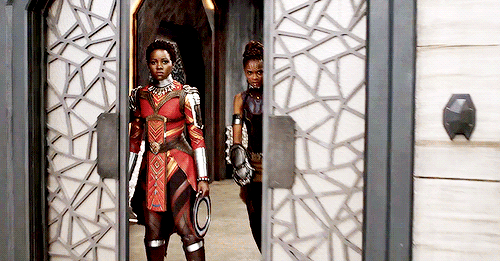Spoiler Alert: If you haven’t seen "Black Panther" yet, read at your own discretion as spoilers are included.
The new hit movie Black Panther showcases an overabundance of key messages that hit home and make all moviegoers reflect deeply and intentionally. From seeing Wakanda as the epitome of black excellence to cherishing how the film inspires us to internalize the allusions made to our ancestral history, the movie delivers on leaving us with more than we can grasp.
However, one of the most important underlying messages found within director Ryan Coogler’s new film draws on the power of black love.
From the beginning of the movie, we see black women with depth, resilience and strength while men, like King T'Challa, show their vulnerability and desire to love. This is important because too often in mainstream media, black men are often depicted as macho and unable to feel emotion while women are often portrayed to be overly-emotional and weak. Black Panther flips this on its head.
In movies, TV shows, documentaries and entertainment news, it’s common for black courtship to be shown through depictions of failed marriages, broken families and single-parent households. With the emphasis Black Panther places on black love, we see that we black couples have the power to be loyal, devoted, dominant and capable of achieving anything we put our energy into together.
In one of the scenes from the film, T’Challa, played by Chadwick Boseman, rescues his ex-lover from a militant cargo brigade carrying African women who are held captive. It’s here that we see how Nakia, played by Lupita Nyong’o, is a warrior in her own right who has made it her mission to save women from the dangers of warfare and violence evident in certain African countries.
Before Black Panther successfully fights the soldiers and helps save the women, Okoye, played by Danai Gurira, who is the leader of his all-women task force, sternly but playfully tells T’Challa not to freeze up when he sees Nakia.
Like many black men would, in instances such as this, he stands tall and confidently states three words:

Courtesy: Marvel Fan Blog
We all know how that turned out.
In this comedic moment, Coogler reminds us that the strength and radiance of black women are character traits that deserve nothing less than the utmost appreciation. Yes, it’s hilarious that our superhero became stunned at the sight of his leading lady, but it happened because he sees everything that he could have ever wished for in the eyes of his love, Nakia.
Through certain moments in the movie, we see how Nakia not only supports T’Challa but also reminds him that he is worthy of his position and more than capable of creating a legacy for himself that is separate from his father’s mistakes or ideology. And when T’Challa is at his most vulnerable point of reflecting about his father’s actions, Nakia states, “Only you can decide what kind of king you want to be.”
This does not mean, however, that Nakia is lusting over T'Challa in the same way. She is adamant, acts with her own sense of agency and determines her own fate, which may very likely be the traits that T'Challa admires so much about her.

Courtesy: The National/Marvel
In the movie, we’re also floored by the courage, boldness and fortitude displayed by the Dora Milaje, the warrior women who serve as protectors of the king and royal family of Wakanda. Okoye, who is played by Danai Gurira, leads the Dora Milaje as general. She is also the wife of W'Kabi, played by Daniel Kuluuya, who — after going to battle to defend Killmonger, is put in check by his wife as she threatens to kill him in defense of T'Challa and Wakanda.
It's something serious when a black woman can get her man to cut his foolishness and stop a war. It takes black power and black love to another level.
However, #blacklove does not always show up romantically — it can be found in the love and consistent support shown by the King’s mother and sister.
Queen Ramonda, played by everyone’s favorite auntie Angela Bassett, is the loving motherly figure, who, even after withstanding the deepest tragedy of losing her husband, remains focused on better days.
She stands fervently by her son’s side as T’Challa strives to rule and continue his father's legacy. Even as he staggers at times, it’s his mother who joins Nakia in avenging his “death” while continuing to stress to him that the world is his.

Courtesy: Giphy
T'Challa's incomparable younger sister Shuri (Letitia Wright) also has her own way of showing her love by serving as her brother's keeper during every trial and tribulation he faces.
At every corner he turns, she is there for him whether it is to fight, laugh or cry. Shuri uses her skills in technology to equip her brother with the best costume and gadgets he could ask for. She supports Nakia’s undying love for T’Challa and fights alongside the task force who defends the king.

Courtesy: Black Panther Daily
As black men in present-day society should, King T’Challa realizes how important the women in his life are to his success and appreciates that they will go to great lengths to be the support system he needs. By the end of the film, our dreams come true as T'Challa and Nakia reunite, creating a charming couple representative of the relationships black people can so rightfully aspire to reach.
Black people have been empowered by Black Panther as it paints a beautiful depiction of how unified and powerful our culture can be and has been in African history. The overarching theme is riveting and motivational, and audiences can see the glory of the movie’s emphasis on black love. From Coogler’s intention to beautify the image of what black love is and can truly be, black men, women, boys and girls can see that black love is the boldest love.

Courtesy: Giphy
